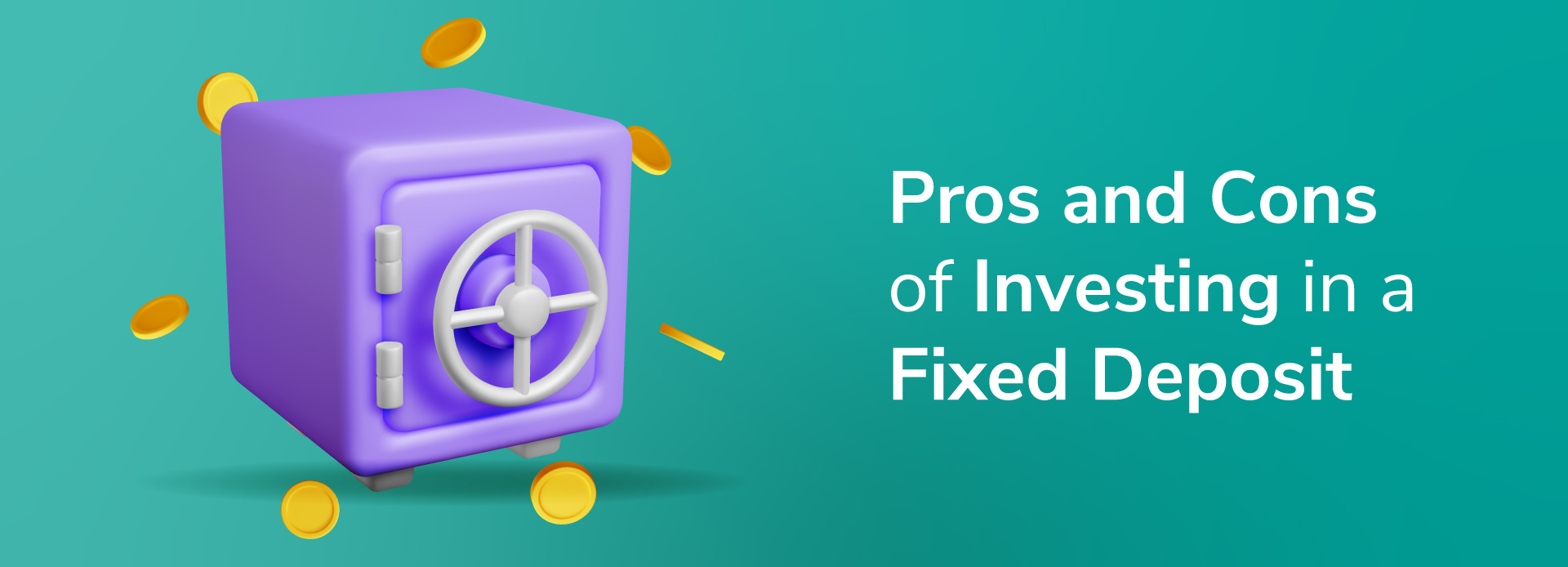
Pros and Cons of Investing in Fixed Deposits
08 February 2024 | By INDIE
It is important to consider the numerous options available in the market before investing your hard-earned money. There are securities-related investments like mutual funds and stocks which are volatile and then there are safer investment options such as fixed deposits for those who have a low risk tolerance. Fixed deposit (FD) accounts have been a popular choice among investors for years since these deposits offer a secure avenue to preserve and grow your wealth. However, like any other investment, fixed deposits also come with certain upsides and downsides. Go through the following article to learn about the advantages and disadvantages of fixed deposits that will help you with making an informed financial decision.
Advantages of Investing in Fixed Deposits
1. Stability and security: Fixed deposits are a stable and secure investment option. With a predetermined interest rate, your principal amount remains intact and independent of market performance, and you can rely on a steady return on your investment.
2. Predictable returns: One of the significant advantages of FDs is the predictable nature of returns. As the interest rates are fixed at the time of your investment, you can easily calculate the returns you will receive at maturity.
3. Higher interest rates than conventional Savings account: Fixed deposits offer higher interest rates compared to conventional financial tools like a savings account. Additionally, if you run a simple search online, you can find online FDs such as the IndusInd Bank’s INDIE fixed deposits which offer one of the highest FD interest rates of up to 7.75% p.a. in the banking sector.
4. Low risk: FDs are considered low-risk investments as compared to more volatile options like stocks. The fixed nature of returns shields investors from market fluctuations, making FDs an attractive choice for risk-averse individuals.
5. Loan against fixed deposit: A unique advantage of FDs is that you can avail loan against them. This can be a valuable resource in times of financial need, providing liquidity without having to break your FD prematurely.
Disadvantages of Investing in Fixed Deposits
1. Inflation impact: While FDs offer stability, the returns may not always keep pace with inflation. This means that the real value of your money might decrease over time, especially if inflation rates are higher than the FD interest rates.
2. Interest rate fluctuations: The interest rates on fixed deposits are subject to change based on economic conditions. If you lock in your money at a lower interest rate for a long tenure, you might miss out on potentially higher returns if the interest rates rise later.
3. Penalty on premature withdrawals: Breaking an FD before maturity can result in a penalty and a lower interest payout. This lack of flexibility can be a disadvantage if you unexpectedly need access to your funds.
4. Tax implications: The interest earned on fixed deposits is taxable above the limit of ₹40,000 (₹50,000 for senior citizens), and depending on your income slab, it may significantly impact your overall returns.
Should You Invest in a Fixed Deposit?
The decision to invest in fixed deposits depends on your financial goals and risk tolerance. If you seek stability, predictable returns, and can withstand the impact of inflation, FDs could be a suitable investment. However, if you are looking for higher returns and are willing to take on more risk, you can also consider exploring other investment avenues.
If you are looking for the highest FD interest rates, consider opening an account through the IndusInd Bank INDIE app. You not only enjoy attractive interest rates of up to 7.75% per annum but also get a completely seamless application process to open an FD digitally. With minimal documentation and a quick onboarding process, you can access your account within a few minutes and start investing with amounts starting from as low as ₹1,000.
Conclusion
Fixed deposits are a time-tested investment option which offers stability and security. However, it comes with its own set of pros and cons. Assessing your financial objectives, risk tolerance, and the current economic scenario can help you with determining whether fixed deposits align with your investment strategy. By weighing the advantages and disadvantages of fixed deposit accounts, you can make an informed decision that suits your financial needs and aspirations.





